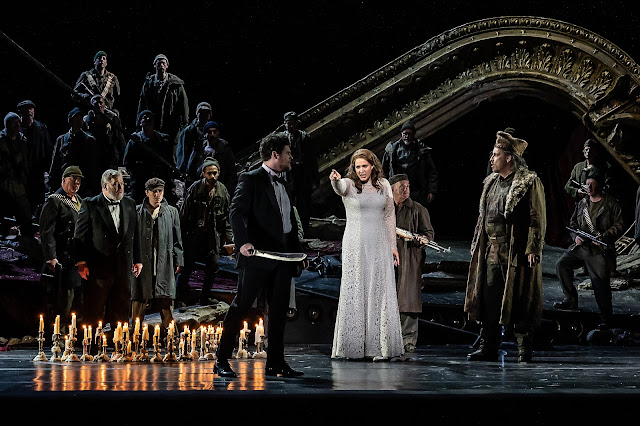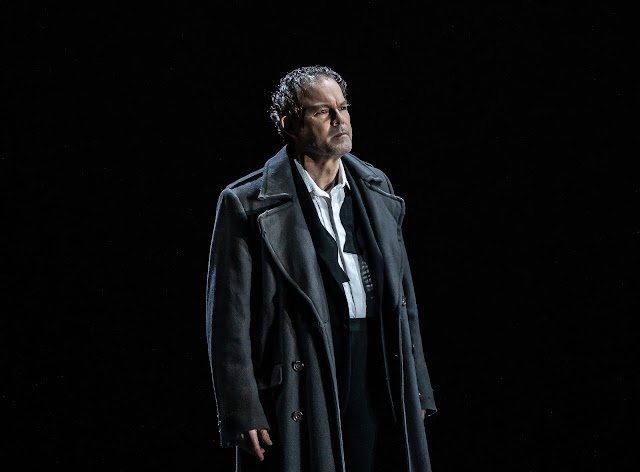 |
| PIQUE DAME von Pjotr I. Tschaikowskij, Premiere am 9. März 2024 in der Deutschen Oper Berlin, copyright: Marcus Lieberenz Countess (Doris Soffel) and Hermann (Martin Muehle) |
Tomsky – Lucio Gallo
Prince Yeletsky – Thomas Lehman
Chekalinsky – Chance Jonas-O’Toole
Surin – Kyle Miller
Chaplitsky – Andrew Dickinson
Narumov – Artur Garbas
Master of Ceremonies – Jörg Schörner
The Countess – Doris Soffel
Lisa – Maria Motolygina
Pauline – Karia Tucker
Governess – Nicole Piccolomini
Masha – Arianna Manganello
Children’s commander – Sofia Kaspruk
Little Hermann – Aleksandr Sher
Little Lisa – Alma Kraushaar
Stage piano – Jisu Park
Old servant – Wolfgang Siebner
Designer – Stuart Nunn
Choreography – Ron Howell
Video – Martin Eidenberger
Lighting – Linus Fellborn
Assistant directors – Constanze Weidknecht, Silke Sense
Dramaturgy – Konstantin Parnian
The late Graham Vick was to have directed
this new production of The Queen of Spades for the Deutsche Oper. According
to the cast list, Vick laid down the principles for the production, but his successor
Sam Brown, charged with bringing the project to completion, alongside designer
Stuart Nunn and choreographer (and Vick’s widower) Ron Howell, will necessarily
have brought much that his own to the piece. As he says in an interview, ‘I
knew that the framework that he’d created provides a lot of room for conceptual
freedom. … It may sound dramatic, but Graham’s ideas for PIQUE DAME outside of
the equipment died with him. As a director, I have to walk my own path.’ Tempting
though it may be to speculate what comes from whom, that is hardly the point. Having
noted the situation, it is better to move on to discuss what it is we see and
hear.
 |
| Chekalinsky (Chance Jonas-O'Toole), Tomsky (Lucio Gallo), Surin (Kyle Miller) |
Layering of memory is a particular strength. Tchaikovsky – and his brother and librettist, Modest, as well of course as Pushkin – play with memories of the eighteenth century. That is doubled by the Countess’s memories of her ‘own’, earlier eighteenth century, Mme de Pompadour and all. The Grétry air is another case in point. In this production, without being merely indeterminate or arbitrary, which would defeat the point, further nesting occurs, for instance in the silent film excerpts (from a Russian adaptation of 1916), but also in the dressing and undressing of particular characters at different points, as well as in broader designs. Spanning three centuries – the nineteenth may not be overtly depicted on stage, but it is always present – is not an easy trick to bring off, but it is meaningfully accomplished here. Moreover, it is with us from the start, the opening scene with children’s chorus pointing to much of what is to come. A maltreated child, a social outsider even then, is abused by children and adults alike, only to have a little girl briefly come to him and show a little kindness. It prefigures what is to come, but perhaps it is also a memory. In this opera, though, it is always too late. The cards dealt by fate can never be changed, despite – or because of – their entirely random nature in what is no game of skill.
 |
| Hermann, Countess |
The cast acts out this game and propels it with great skill, heightening and extending its outlines in much the same way the production does. Martin Muehle’s Hermann is tireless, anguish-ridden, obsessive, perhaps a little on the Verdian side of Tchaikovsky, but I am not sure it behoves me, as one who speaks no Russian, to be too fussy here. It was above all his journey of catastrophe, and no one could doubt that Muehle grasped his fate and followed it. But it is not only his journey; part of the problem is surely that the characters are heading in different, mutually opposed and uncomprehending directions. Maria Motolygina’s Lisa, unable to escape from her childhood and clearly presented as such, was by the same token beautifully, often heartrendingly sung, her final scene powerful indeed. As expected, Doris Soffel’s Countess stole the show: not only a sterling performance, that ‘ancient’ air included, but one showing her sexual drives to be as strong as ever, perhaps even more so. Perhaps if she too had questioned her obsessions, she might have been happier—but is there any meaning in that ‘perhaps’? Thomas Lehman’s Yeletsky was finely sung indeed, as, in smaller roles, were Karia Tucker’s Pauline, Andrew Dickinson’s Chaplitsky, Chance Jonas-O’Toole’s Chekalinsky, Kyle Miller’s Surin, and many more, up to and including the chorus. Lucio Gallo’s virile, contemptuously masculine Tomsky showed how this singer can still absolutely hold the stage. Raunchy masked-ball choreography from Howell and excellent performances from the dancers not only returned to several questions already posed, but also asked a good number of their own.
Sebastian Weigle’s conducting had its moments, especially during the third act. (The opera was essentially given in scenes rather than acts, the interval given, as is often the case, following the arrival of Catherine the Great in the middle of the second act.) Then it became more idiomatic, conjuring up from the excellent Orchestra of the Deutsche Oper more of a Tchaikovskian sound than had previously been the case. We should not be too essentialist about such matters, but much previously had sounded rather on the Germanic side, albeit with distinctly odd balances, strings in particular notably subdued. A lack of dramatic sweep, without anything obvious put in its place, proved frustrating.
 |
| Catherine the Great (Doris Soffel) |
Singing and production continued, though, to offer considerable compensation. Soffel’s reappearance as Catherine the Great suggested she and the Countess were one and the same, her mocking laughter at the end of that third scene echoing the Countess’s ghostly reappearance (dressed as Lisa) to name the three cards. Was this all, then, just Hermann’s fevered imagination? And if so, to put it bluntly, what is the point? What we saw was not so cut and dried as that. Indeed, one of the projector quotations between scenes, from Dostoevsky, considering the nature of fantasy, how it must come close to reality, made that clear.
If the scales here are tilted towards fantasy rather than reality, more so than any other production I can recall and than I have tended to think of it, then this remains a single production, concentrating fruitfully on a particular standpoint; another will be free to do something else. And it is only limited by it to the extent that almost any standpoint will limit: it enabled and heighted a strong sense of fate, from which not only Hermann, but also Lisa and indeed the Countess wish to escape, yet ultimately knew they cannot—and do not.
There is, I think, something psychoanalytical to the approach. Certainly everything appears to be built on misunderstandings or downright lies: untruths, at any rate. What Hermann wants does not really exists; what Lisa wants does not really exist; what the Countess has wanted all her life has probably never existed at all. That holds for others too, not least Yeletsky. For all his apparent good fortune, he loses Lisa, and there is no sense of triumph in his final victory over Hermann. That it ends with a third and final death, all three ultimate protagonists departed, seems fitting in a sense that goes beyond Romantic death wish. Perhaps it is here, then, that the fantastic twist properly resumes, bidding us continue to question what we have seen and heard.




%20LISE%20DAVIDSEN%20%C2%A9ROH%20Tannh%C3%A4user%2023%20Ph.Clive%20Barda-250%20adj.jpg)









